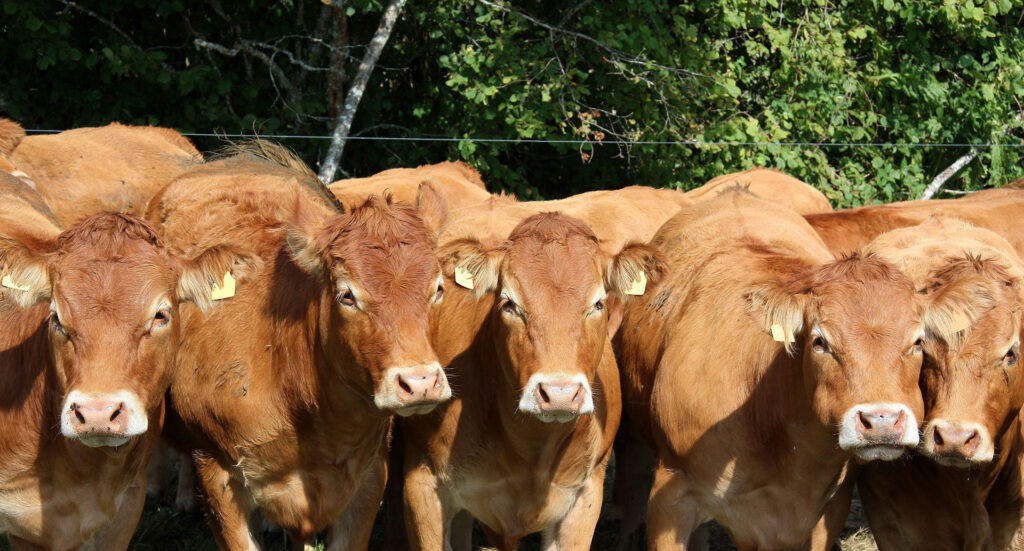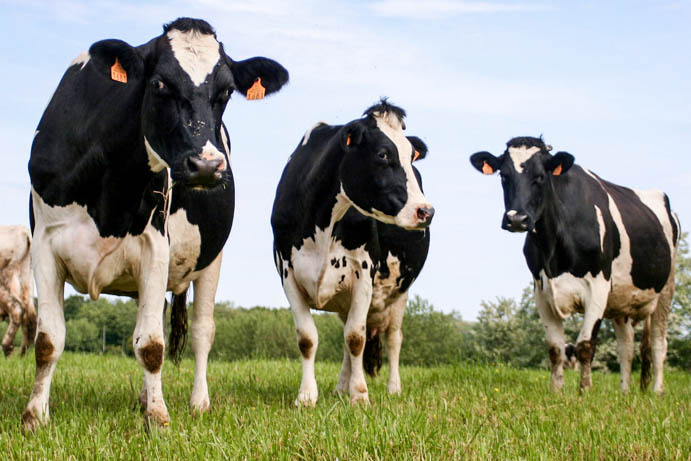
By Dr. K. E. Lanka, Ph.D., P.A.S.
Iodine (I) is one of seven generally recognized micro minerals needed in the diets of dairy cattle and other animals. It is unique among minerals because a deficiency leads to a specific and easily recognizable thyroid gland enlargement, called a goiter. Iodine is important in the synthesis of the thyroid hormones, thyroxine (T4) and triiodothyronine (T3), which regulate energy metabolism in animals. The thyroid hormones are responsible for setting the basal metabolic rate that is a component of the energy needed for the maintenance of the body.
Nutritionists can do this through the diets of animals by ensuring that enough of the mineral is contained in the ration. In the United States, the Great Lakes region and the Northwest area of the country are states with the highest probability of deficiency when local feed ingredients and forages are fed. Examples of these states include Michigan and Montana. Adjacent provinces in Canada are also likely to be deficient in iodine. Forages from all areas of the world are highly variable in iodine content and availability. While the prevention of deficiency symptoms is usually the responsibility of a nutritionist, the treatment of symptoms rests with personnel in the medical professions. So far, no treatment is very effective.
Iodine, through the thyroid hormones, thus plays an important role in thermoregulation to keep body temperature steady and even, especially when the weather is below or above the zone of thermal neutrality for the animal. During cold temperatures, more energy is needed to produce body heat to keep warm. Conversely, energy is needed during hot temperatures to dissipate heat through blood circulation, panting and sweating.
Iodine and the thyroid hormones are important in the functions of lactation, muscle function, immune defense, normal blood and lymph circulation and seasonality of reproduction. Iodine is also important and involved in the development of a fetus. A deficiency of the mineral will lead to reproductive failures.

Seventy to eighty percent of dietary iodine is absorbed from the rumen as iodide, and about 8% of the dietary iodine is secreted into milk.
Ethylenediamine dihydoiodide (EDDI) is a highly bioavailable source of iodine. It can be used in mineral premixes to meet a portion of the needs of an animal. It is often used for its preventative effects of footrot and pink eye in cattle. EDDI is generally recognized as safe (GRAS) for animals. It is limited to less than 10 mg of iodine per head per day from EDDI. Most organic iodine animal premixes contain 9.2% EDDI or 42 grams EDDI/lb. If sulfates are present in an animal feed, they may react with EDDI and release free iodine.
Cattle that have inadequate levels of I in their diets may show symptoms of deficiency for as long as a year after cattle have been fed the deficient diets. A deficiency of I in the diets of animals can have detrimental effects on their performance.
Substances that interfere with the synthesis or secretion of thyroid hormones and cause hypothyroidism are called goitrogens. These fall into two categories: cyanogenic goitrogens and progoitrins. The cyanogenic goitrogens impair iodide uptake by the thyroid gland. They can be found in many feeds, including raw soybeans, beet pulp, corn, sweet potato, white clover, and millet. The effects of cyanogenic goitrogens can be easily overcome with increased dietary supplemental iodine.
On the other hand, progoitrins and goitrins prevent the formation of the thyroid hormones. These cannot be easily overcome with additional dietary supplementation of iodine. These compounds can be found in feedstuffs, including rape, kale, cabbage, turnips, mustard, and onions. To restore thyroid hormones to normal, these ingredients will need to be reduced or removed from the diet.
The NRC Nutrient Requirements for Dairy Cattle states that iodine toxicity has been reported in adult dairy cows with dietary intakes of just 50 mg/day (about 5 mg/kg dietary DM). The NRC Nutrient Requirements for Beef Cattle states that the maximum tolerable level of iodine is 50 mg/kg of diet. For dairy cattle, legal limits in milk take priority over the toxicity level in feed and should not exceed 0.5 ppm (mg/kg) in dietary dry matter.
In the past, toxicity symptoms have been caused by the excessive use of EDDI in the oral treatment of footrot and lumpy jaw. With the FDA feeding rate regulation, these symptoms are seldom seen.
 nasal discharge and tearing
nasal discharge and tearingIn summary, iodine is a key micro mineral in cattle nutrition. Like all required minerals, it has a minimum level necessary for proper metabolic function in an animal. Also, like all required nutrients, too much iodine can become toxic. It is an important component of thyroid hormones that are necessary for energy metabolism in animals. It is unique among minerals because a deficiency will cause a distinct abnormality of the thyroid gland, called a goiter. Many areas of the United States and other countries have soils that are deficient in iodine, leading to a need for supplementation with this micromineral in the diet.
Agri-King rations are balanced to meet the nutrient needs of the animals that are fed by clients. For more information about Agri-King nutrition, contact a representative near you.
References:
National Research Council. 2000. Nutrient Requirements of Beef Cattle. Nutrient Requirements of Domestic Animals. National Academy of Sciences, Washington, D.C.
National Research Council. 2001. Nutrient Requirements of Dairy Cattle. Nutrient Requirements of Domestic Animals. National Academy of Sciences, Washington, D.C.
Maynard, L. A., J. K. Loosli, H. F. Hintz, and R. G. Warner. 1979. The inorganic elements and their metabolism. In Animal Nutrition. McGraw-Hill Book Company, New York. p. 256-260.
Underwood, E. J. and N. F. Suttle. 2001. Iodine. In The Mineral Nutrition of Livestock (3rd Ed.), CABI Publishing, New York, p. 343-373.